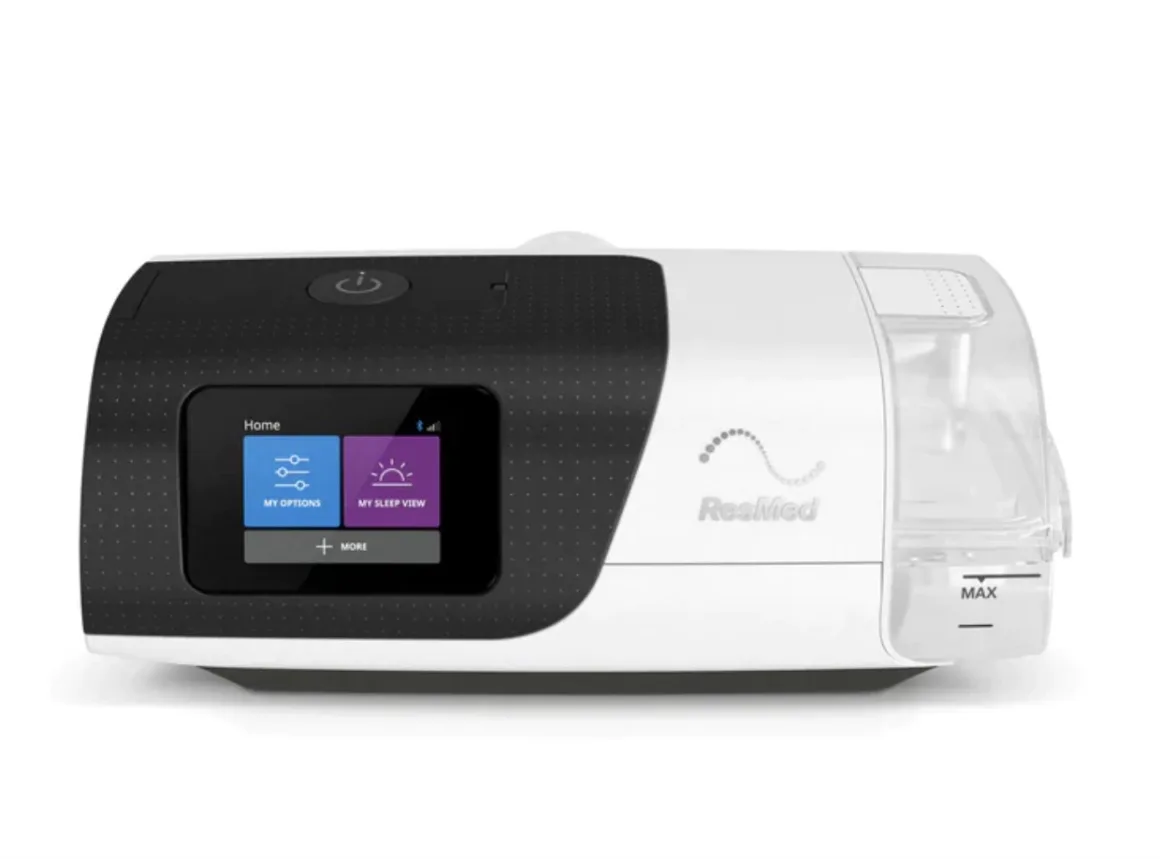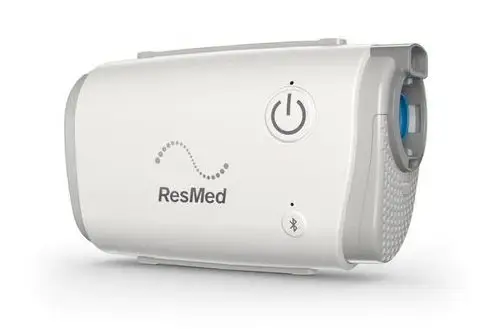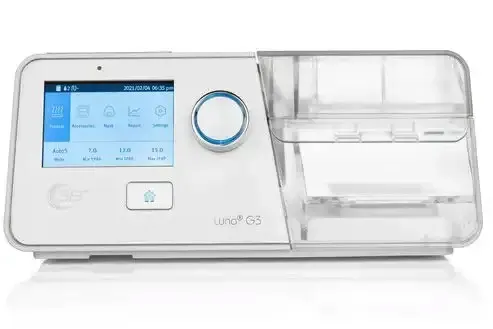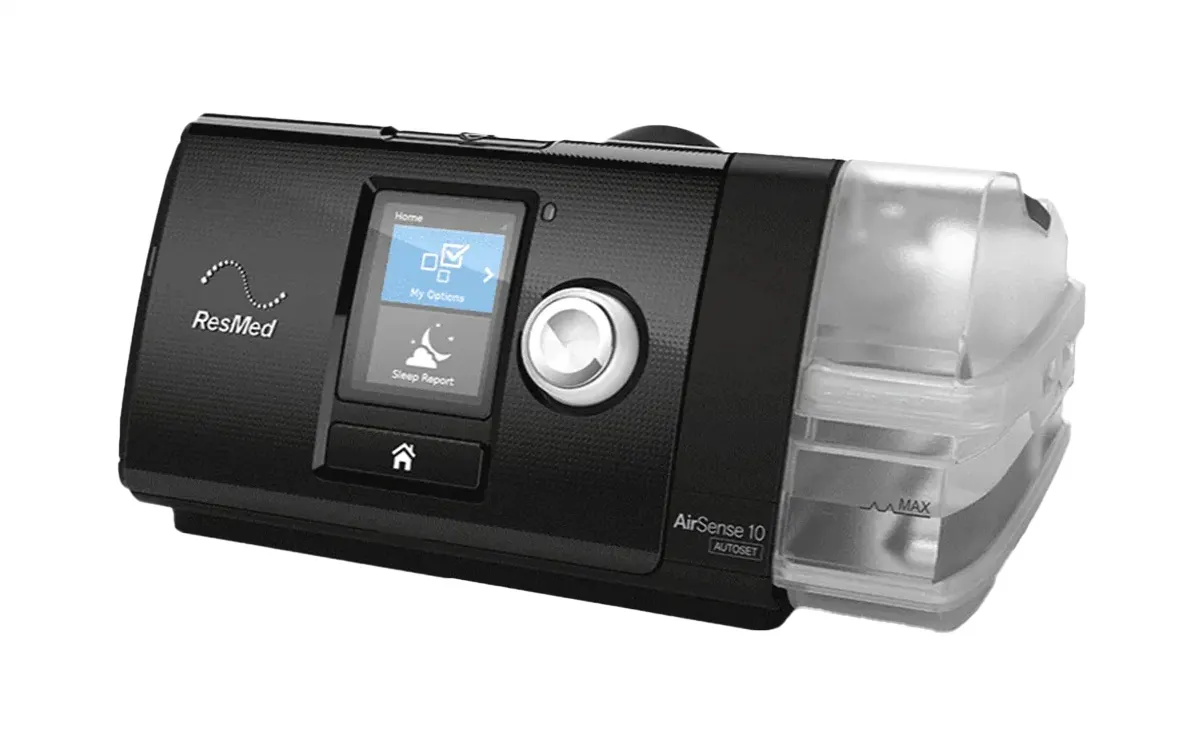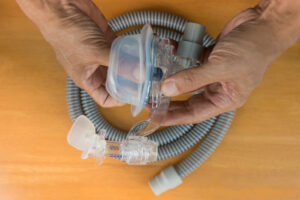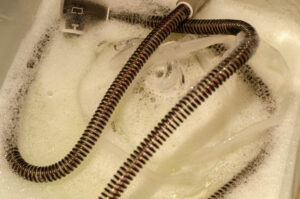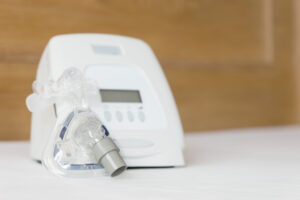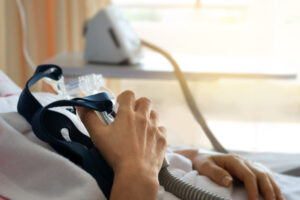Medical disclaimer: The following content should not be used as medical advice or as a recommendation for any specific treatment. Before making any lifestyle changes, consult your health care professional.
ResMed Airsense 11 AutoSet
The ResMed AirSense 11 AutoSet took the top spot because it has all the features we look for in a premium CPAP device, including an easy-to-use touchscreen, a built-in humidifier, and an AutoRamp feature that detects sleep onset. Plus, owners receive access to ResMed’s online and smartphone-based support services.
If you’ve been diagnosed with sleep apnea, you’ve probably heard about the benefits of continuous positive airway pressure (CPAP) therapy. CPAP machines use pressurized air to keep your airway open as you sleep. While these devices can improve breathing for most people with sleep apnea, it can be hard to know what to look for when shopping for a CPAP machine.
We’ve created this guide to help you find the best CPAP machine that’s tailored to your specific needs. For more specialized guides, take a look at the best travel CPAP machines to take on the road and the best CPAP masks in both nasal and full-face designs.
On This Page:
Sleep Doctor’s Picks | Sleep Doctor’s Shopping Guide | Sleep Doctor’s Product Research
Sleep Doctor’s Picks
Pros
- AutoSet mode automatically adjusts pressure levels based on your breathing patterns
- Built-in humidifier may improve therapy comfort
- Compatible with ClimateLineAir heated tubing
Cons
- More expensive than basic fixed-pressure CPAP devices
- Slightly noisier than some competing models
Sleep Doctor’s Review
The best CPAP machine for any given sleeper largely depends on factors like severity of OSA symptoms, pressure needs, and personal preferences. That said, the AutoSense 11 from ResMed should check a lot of boxes for the majority of today’s CPAP users. This device automatically adjusts pressure based on your breathing levels, which can be particularly beneficial if you prefer different pressure levels for breathing in and out.
A built-in humidifier also helps ensure a more comfortable sleep experience by minimizing condensation and reducing the chance of rainout — a common source of congestion for those who rely on CPAP therapy. The connective tube is heated for additional comfort during the night.
The AirSense includes MyAir, a built-in virtual assistant to guide you through the process of setting up the machine and acclimating to CPAP. You can also use MyAir for troubleshooting, and receive sleep coaching and tips from the device. The interface’s light sensor adjusts brightness settings based on your bedroom’s light levels. Weighing 2.5 pounds, the machine is lightweight and travel-friendly. It retails for $1,499.
Since the AirSense 11 is available with “for him” and “for her” algorithms, you should talk to your doctor about which setting will best meet your needs. A 2-year warranty from ResMed covers various defects in your device.
Pros
- Compact design weighs less than a pound
- Offers advanced functions such as an APAP mode and ramp settings
- Smartphone app lets you easily view your sleep data
Cons
- Portable battery not included
- Only works with certain ResMed masks unless you purchase an adapter
Sleep Doctor’s Review
The ResMed AirMini AutoSet Travel CPAP Machine offers an impressively small design without sacrificing functionality. This unit is small enough to fit in almost any backpack or purse but is powerful enough for higher pressure settings up to 20 centimeters of water pressure (cm H2O).
The ResMed AirMini also provides many of the advanced features included with full-size CPAP models, including automatic pressure adjustments and a pressure ramp setting with sleep onset detection. The ResMed AirMini AutoSet retails for $1,399. It also includes a waterless humidification system that lets users add moisture to the pressurized air without having to travel with distilled water.
This unit is Bluetooth capable and can connect to your smartphone. With the AirMini by ResMed app, you can track and share sleep data with your health care provider. The device can store up to 365 days of sleep data, while the AirMini app provides unlimited cloud storage.
You can power the ResMed AirMini via a wall outlet or an external battery, but keep in mind that a battery is not included. Additionally, unlike many CPAP machines, the ResMed AirMini is only compatible with certain ResMed mask models.
Lightweight and versatile, the ResMed AirMini AutoSet Travel CPAP Machine is a great choice for people who are often on the road but want the premium features of a full-size CPAP machine.
Pros
- Built-in heated humidifier includes a preheat setting
- Four therapy modes
- BiPAP modes deliver different pressures during inhalation and exhalation
Cons
- High price-point
- No spontaneous-timed mode
Sleep Doctor’s Review
The Luna G3 BiLevel 25A CPAP Machine comes with multiple features to improve your comfort and sleep during CPAP therapy. The unit contains a built-in humidifier and integrated heated tubing to prevent condensation. A preheat setting warms the humidifier chamber while you get ready for bed, while an auto ramp feature keeps the pressure low until you fall asleep.
In addition to a standard CPAP setting, the machine features an automatic positive airway pressure (APAP) mode that automatically adjusts the air pressure level based on the user’s breathing patterns. This all comes with a price tag of $2,049.
There is also a bi-level positive airway pressure (BiPAP) mode that allows your health care provider to set two different pressures: one for when you inhale and one for when you exhale. This can make therapy more comfortable for sleepers who have trouble exhaling at a higher pressure level. Additionally, the AutoS function is a BiPAP mode that auto-adjusts when it detects an apneic event.
With a noise rating of just 26 decibels, this is one of the quieter models we’ve encountered. Your purchase includes a travel case and CPAP hosing, and the machine is protected by a two-year warranty from the manufacturer.
Overall, the Luna G3 BiLevel 25A CPAP Machine offers a compact design and a number of features to help you sleep better during CPAP therapy. This makes it an excellent option for sleepers who need a BiPAP machine or simply want a more comfortable CPAP experience.
Best Value CPAP Machine
ResMed AirSense 10 AutoSet Connected with HumidAIr and ClimateLineAir
Shop NowPros
- Auto-titrating function adjusts pressure automatically
- Extended ramp and pressure relief settings
- More affordable than the AirSense 11
Cons
- Not needed for people who don’t mind standard CPAP machines
- Sleep disruptions may occur during pressure adjustments
Sleep Doctor’s Review
Weighing less than 3 pounds, the ResMed AirSense 10 is small and lightweight but is among the most feature-packed units on the market. An approachable price-point of $1,164 also makes the device suitable for shoppers with tight budgets or limited insurance coverage.
The machine includes a HumidAir heated humidifier and ClimateLineAir heated tubing, both designed to reduce condensation and help you breathe comfortably throughout the night. A straightforward LCD screen menu allows you to easily navigate between the machine’s many features. The screen has a sensor that automatically adjusts the brightness and turns off when not in use.
The AutoSet algorithm adjusts pressure within a set range based on your prescription and breathing patterns. Another useful feature is the ramp time, which slowly increases pressure levels leading up to sleep. The machine decreases pressure as you exhale.
ResMed backs the AirSense 10 AutoSet Connected with HumidAir and ClimateLineAir with a 2-year warranty against manufacturing defects.
How Does CPAP Therapy Work?
CPAP therapy involves using a bedside machine that provides a steady stream of air to prevent breathing interruptions while you sleep. It’s particularly effective at treating obstructive sleep apnea (OSA), the most common type of sleep apnea. In OSA, tissues in the throat narrow or block the upper airway during sleep, repeatedly interfering with normal breathing.
A CPAP machine works by filtering and pressurizing air, which is then delivered to your airway through a hose and a mask. The force of the pressurized air splints the airway open to facilitate uninterrupted breathing.
What to Consider When Buying a CPAP Machine
While buying a CPAP machine requires a prescription, there are still a wide range of brands and models to choose from. Different CPAP machines offer unique combinations of features, so it’s important to consider what fits best with your lifestyle and needs.
Pressure Range
Air pressure delivered by a CPAP machine is measured in centimeters of water pressure (cm H2O), and most models can provide pressure levels up to 20 cm H2O. Some CPAP machines also come with a ramp feature to help you fall asleep. Ramp settings start therapy at a lower pressure before slowly increasing it to the prescribed level over a set period.
Noise Level
The average sound level of a CPAP machine is around 30 decibels, which is about as loud as a soft whisper. Some models have special features or designs that reduce the sound level even further. Quieter models may be particularly helpful for anyone who needs a quiet environment to fall asleep.
Smart Features
Many CPAP machines include smart features to make them more comfortable and easy to use.
- LCD Displays: Some models have advanced displays that make it easier to navigate menu options, especially in the dark.
- Data Tracking: All modern CPAP machines track some data to help your doctor evaluate the treatment’s effectiveness, but some models collect more data points and track your sleep patterns.
- Cellular Connectivity: CPAP machines may collect your data on a memory card stored in the device, sync your data over cellular service to a cloud-based platform, or allow for a combination of both.
- Preheat Function: Humidifiers are a common feature of CPAP machines that add moisture to air as it’s delivered through the hose and mask. Some CPAP devices have a preheat function that warms up the humidifier water before use.
What Are the Different Types of PAP Machines?
CPAP is one type of positive airway pressure (PAP) machine, though alternative devices are available with slightly different functions.
| PAP Machine | Description |
|---|---|
| Continuous positive airway pressure (CPAP) | A standard CPAP machine offers a consistent level of air pressure throughout the night. Following a sleep apnea diagnosis, the appropriate air pressure level is typically determined during a titration study at a sleep clinic. |
| Bilevel positive airway pressure (BiPAP) | BiPAP machines switch between two levels of air pressure: a higher level when you inhale and a lower pressure when you exhale. This type of machine may be prescribed if you have difficulty tolerating a fixed-pressure CPAP device or if you need treatment for another type of breathing condition, such as central sleep apnea. |
| Automatic positive airway pressure (APAP) | APAP machines use sensors and algorithms to automatically adjust the air pressure level based on your breathing patterns. Rather than a machine itself, APAP is a technology that is available in certain CPAP and BiPAP devices. However, the term APAP machine is typically reserved for a CPAP device that includes an auto-adjusting feature. |
| Travel CPAP machines | Designed for convenience and portability, travel CPAP machines are compact and lightweight. While functioning similarly to a standard CPAP machine, their small size helps you stay consistent with therapy even when you’re away from home. Many travel CPAP machines also have APAP modes. |
CPAP Accessories
While a mask, tubing, and an air filter are essential components of CPAP therapy, other accessories can enhance your comfort and the effectiveness of treatment.
| Accessory | Description |
|---|---|
| Mask | A CPAP mask delivers air to your nose or your nose and mouth. A mask needs to feel comfortable yet maintain a strong seal against your face to prevent leaks. Headgear keeps the mask in place. |
| Tubing | CPAP tubing connects the machine to your mask. Hoses come in many different lengths and styles. Some models offer special features like in-line heating. |
| Filters | Filters clean the air that is pressurized and delivered by a CPAP machine. FIlters may be washable or disposable and should be replaced according to the manufacturer’s instructions. |
| Battery | CPAP batteries aren’t essential, but they can ensure consistent performance during travel or power outages. Some batteries are specific to one CPAP device, while others can be used with various models. |
| CPAP pillow | CPAP pillows are designed to help you sleep while using a CPAP machine. These pillows have special shapes, cutouts, or other features that make it more comfortable to sleep while wearing a mask and headgear. |
Pricing, Insurance, and Where to Buy a CPAP Machine
CPAP machines typically range from $500 to over $1,000, influenced by factors like the brand, features, and any accessories included with your purchase. A prescription from your doctor is required to buy a CPAP machine, as it’s considered a Class II medical device regulated by the Food and Drug Administration.
Most insurance plans, including Medicare and Medicaid, cover some CPAP costs under certain conditions, including whether you demonstrate that you use your CPAP machine consistently. Even when covered by insurance, there may still be out-of-pocket costs like a copay or deductible.
Once you have a prescription, a CPAP machine can be purchased online, in medical supply stores, and sometimes directly through doctors and sleep specialists.
Discover More CPAP Solutions
If you’re looking for more product recommendations and CPAP tips, check out our expert guides that we’ve broken down into convenient categories.
How We Make Our Picks
Our team has a strong knowledge base when it comes to the fundamentals of sleep apnea and CPAP products. We also know it can be difficult for consumers to wade through all the CPAP machines on the market.
To make it easier for you to find a CPAP machine that meets your needs, we’ve researched dozens of models. After looking at the most trusted brands and comparing features, availability, and customer reviews, we selected the best CPAP machines across a range of categories.
Frequently Asked Questions
While CPAP machines are generally safe and effective, some users experience mild discomfort, like dryness, nasal congestion, or irritated skin. These issues are often manageable with adjustments to the machine or accessories.
Always follow the manufacturer’s recommendations when cleaning CPAP accessories. For most masks, hoses, and humidifier water chambers, regular cleaning with warm water and mild soap is recommended. For deeper cleaning of the humidifier tank, a solution of warm water and white vinegar can be effective. Be sure to fully rinse and air dry all components before using your machine again.
A prescription is required to purchase a CPAP machine, as they are classified as Class II medical devices by the FDA.
You can purchase a CPAP machine online. Many people opt for online shopping because you can easily compare the prices and features of different models. Online shopping also allows you to read customer reviews and find helpful online resources.
Ask the Sleep Doctor
Have questions about sleep? Submit them here! We use your questions to help us decide topics for future articles, videos, and newsletters. We try to answer as many questions as possible. You can also send us an email. Please note, we cannot provide specific medical advice, and always recommend you contact your doctor for any medical matters.
